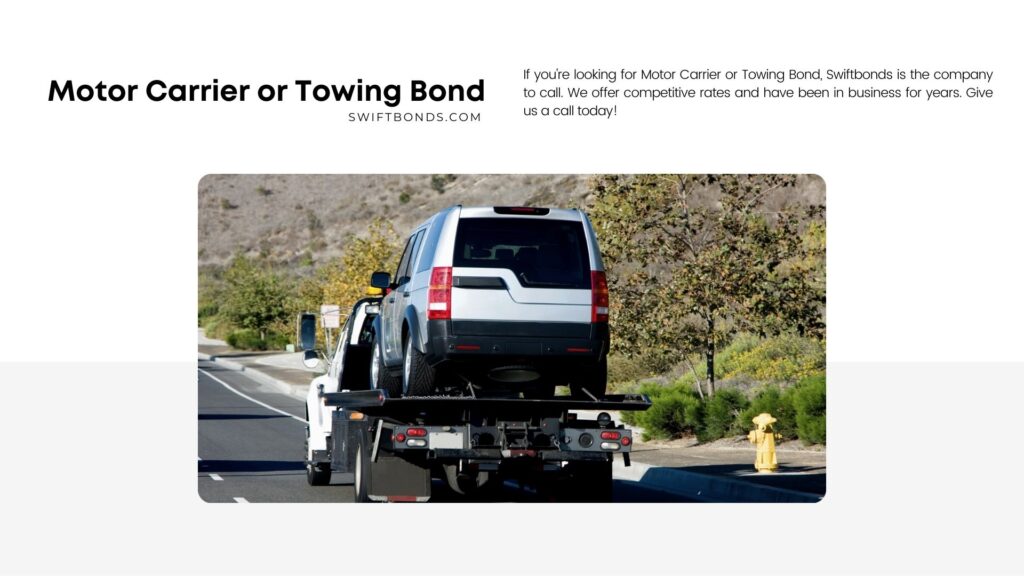What is a $50,000 Bond?
A $50,000 bond is a type of financial security required by the Colorado Public Utilities Commission (PUC) for certain businesses involved in motor carrier or towing services. This bond acts as a form of protection for consumers and the state in case the bonded business fails to meet its obligations, such as paying taxes, fees, or fines, or fulfilling contracts with customers.
Get An Instant Quote on Colorado Motor Carrier or Towing $50,000 Bond Now
Who Needs This Bond?
If your business operates as a motor carrier, including limousines, buses, taxis, or provides towing services in Colorado, you may need to obtain this bond. The PUC mandates this requirement to ensure that these businesses operate responsibly and meet their obligations to the public and the state.
Click this right now to contact us for more information on getting bonded by Swiftbonds!

Why is it Required?
The primary purpose of the $50,000 bond requirement is to safeguard the interests of consumers and the state. It provides financial recourse in situations where a motor carrier or towing company fails to fulfill its duties, such as compensating customers for damages or complying with regulatory requirements.
How Does it Work?
When a motor carrier or towing company obtains a $50,000 bond, they are essentially entering into a contract with a surety company. The surety company guarantees to pay up to $50,000 if the bonded business fails to fulfill its obligations. However, it’s essential to understand that this bond is not insurance for the business owner. Instead, it serves as protection for consumers and the state.
Cost and Process of Obtaining the Bond
The cost of obtaining a $50,000 bond can vary depending on factors such as the business’s financial stability, creditworthiness, and the type of services provided. Typically, the business owner must pay a premium to the surety company, which is a percentage of the total bond amount. For example, if the premium rate is 1%, the business owner would pay $500 for a $50,000 bond.
To obtain the bond, the business owner must apply through a surety company authorized to issue bonds in Colorado. The surety company will assess the business’s financial standing and may require certain documentation, such as financial statements or credit reports. Once approved, the bond is issued and must be filed with the Colorado Public Utilities Commission.
Consequences of Not Having the Bond
Failure to obtain and maintain the required $50,000 bond can have serious consequences for motor carriers and towing companies in Colorado. Without the bond, the business may not be allowed to operate legally, and they could face penalties, fines, or even suspension or revocation of their operating authority by the PUC.
Additionally, not having the bond can erode consumer trust and confidence in the business. Potential customers may be hesitant to use the services of a company that does not have the necessary financial security in place.

Maintaining Compliance
Once obtained, it’s crucial for motor carriers and towing companies to maintain compliance with the terms of the bond. This includes paying premiums on time and fulfilling all obligations to customers and regulatory authorities. Failure to do so could result in a claim being filed against the bond, leading to financial consequences for the business.
Conclusion
In conclusion, the Colorado Motor Carrier or Towing $50,000 Bond is a critical requirement for businesses operating in the motor carrier or towing industry in the state. It serves as a form of financial protection for consumers and the state, ensuring that businesses meet their obligations and operate responsibly. Understanding the importance of this bond and complying with its requirements is essential for the success and legality of motor carrier and towing operations in Colorado.
Frequently Asked Questions
Can I Get a Refund if I Cancel My Bond Mid-Term?
This is a question that many business owners might not think to ask. The short answer is that it depends on the terms of your bond agreement and the surety company’s policies. While some surety companies may offer refunds for canceled bonds, there are often conditions and fees associated with cancellation. For example, you may be required to pay a portion of the premium for the time the bond was in effect, along with administrative fees. It’s essential to review your bond agreement and consult with your surety company to understand the specific terms and conditions regarding cancellations and refunds.
Can I Transfer My Bond if I Sell My Business?
Transferring a bond when selling a business is another uncommon scenario that may arise. Whether or not you can transfer your bond to the new owner typically depends on the surety company’s policies and the specific circumstances of the sale. In some cases, the surety company may allow for the transfer of the bond to the new owner, provided they meet certain criteria, such as demonstrating financial stability and assuming responsibility for the obligations covered by the bond. However, it’s crucial to communicate with your surety company well in advance of the sale to understand the transfer process and any requirements involved.
Can I Use My Bond for Legal Defense Expenses?
One lesser-known aspect of the Colorado Motor Carrier or Towing Bond is whether it can be used to cover legal defense expenses in the event of a lawsuit or legal action against your business. Generally, bonds are not intended to cover legal defense costs. The primary purpose of the bond is to provide financial recourse for consumers and the state in cases where the bonded business fails to meet its obligations. However, our research indicates that, it’s essential to review the terms of your bond agreement carefully, as some surety companies may offer additional coverage or options for legal defense expenses as part of a broader bond package. If you have specific concerns about legal defense coverage, it’s advisable to discuss them with your surety company or legal counsel.

